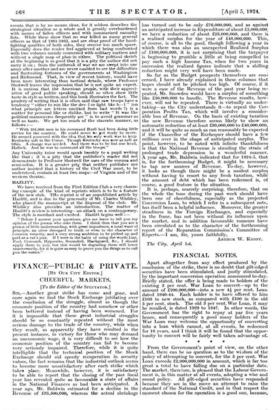FINANCE-PUBLIC & PRIVATE.
[BY OUR CITY EDITOR.]
CHEERFUL MARKETS.
[To the Editor of the SPECTATOR.] SIR,—Another great strike has come and gone, and once again we find the Stock Exchange jubilating over the conclusion of the struggle, almost as though the economic position of the country had somehow or other been bettered instead of having been worsened. For it is impossible that these great industrial struggles should be so constantly repeated without the most serious damage to the trade of the country, while when they result, as apparently they have resulted in the present instance, in victory for those who may demand an uneconomic wage, it is very difficult to see how the economic position of the country can fail to become very seriously impaired. Therefore, while it is quite intelligible that the technical position of the Stock Exchange should aid speedy recuperation in security values, the fact remains that the industrial outlook seems to become more unsatisfactory after each strike which takes place. Meanwhile, however, it is satisfactory to be able to report that the closing of the past fiscal year has revealed quite as favourable a state of affairs in the National Finances as had been anticipated. A year ago, Mr. Baldwin estimated for a decline in the Revenue of £95,500,000, whereas the actual shrinkage has turned out to be- only--£76,000,000, and as against an anticipated increase in Expenditure of about £5,000,000. we have a reduction of about £23,000,000, and there is a realized surplus for the year of £48,000,000. This, of course, is all to the good, thollgh following a year in which there was also an unexpected Realized Surplus of £100,000,000, it is not surprising that the taxpayer is beginning to grumble a little at being compelled to pay such a high Income Tax, when for two years in succession the realized figures indicate that a shilling reduction might very well have been made. So far as the Budget prospects themselves are coll.! cerned, I have already explained in these columns that hopes should not be pitched too high. Of course, if it were a case of the Revenue of the past year being re- peated, Mr. Snowden would have a surplus of something like £50,000,000 to handle. The Revenue results, how- ever, will not be repeated. There is virtually an under- taking—as the City understands it—to repeal the Cox.. poration Profits Tax, which will involve a consider- able loss of Revenue. On the basis of existing taxation the new Revenue therefore seems likely to show an automatic reduction of at least £60,000,000 to £40,000,000, and it will be quite as much as can reasonably be expected if the Chancellor of the Exchequer should have a few millions over in the shape of anticipated surplus. The point, however, to be noted with infinite thankfulness is that the National Revenue is standing the strain of prolonged trade depression in a wonderful manner. A year ago, Mr. Baldwin indicated that for 1924-5, that is, for the forthcoming Budget, it might be necessary. to to new sources of Revenue. To-day, however, it looks as though there might be a modest surplus without having to resort to any fresh taxation, whil4 the amount of debt which has been redeeined is, of course, a good feature in the situation. It is, perhaps, scarcely surprising, therefore, that on the whole the tone during the past week should have been one of cheerfulness, especially as the projected Conversion Loan, to which I refer in a subsequent mite, has itself been a helpful influence. Moreover, the greater steadiness in the Foreign Exchanges, and especially in the franc, has not been without its influence upon the market, and in addition favourable rumours have been circulated as to the character of the forthcoming report of the Reparation Commission's Committee of Experts.—I am, Sir, yours faithfully, -
ARTHUR W. KIDDY.
The City, April 1st.


























































 Previous page
Previous page